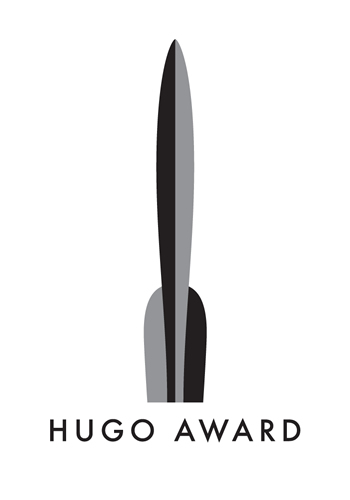 Not sure how many of these I’ll get to this year before the July 31st voting deadline, but for the first time ever I’m a member of the World Science Fiction Convention and, therefore, eligible to vote on the Hugo Awards. I’m taking this fairly seriously and making an effort to actually survey all of the nominees before casting my ballot. And I thought I’d also take the opportunity to share my thoughts with you.
Not sure how many of these I’ll get to this year before the July 31st voting deadline, but for the first time ever I’m a member of the World Science Fiction Convention and, therefore, eligible to vote on the Hugo Awards. I’m taking this fairly seriously and making an effort to actually survey all of the nominees before casting my ballot. And I thought I’d also take the opportunity to share my thoughts with you.
We’re going to start with the short stories. Reviewing short stories is a tough gig because it’s really hard to comment meaningfully upon them without spoiling them entirely, but I’ll do the best I can to walk the tightrope here. Without further ado, here’s my voting slate for the Short Story category in reverse order:
5. “If You Were a Dinosaur, My Love” by Rachel Swirsky.
Despite the use of the word “dinosaur” in the title (and its frequent use throughout the text), this is not actually a work of speculative fiction. I’m not really sure the story is award worthy even if it were speculative fiction (it’s a decent little “shocker” story with a twist reveal, but while the prose builds nicely the twist is more of a straight line and there’s nothing of real substance here), but since I consider the Hugo Award to be something exclusively for speculative fiction I’m definitely forced to rank this one below…
4. NO AWARD
3. “The Water That Falls on You From Nowhere” by John Chu.
This story starts out really strong, but then somehow ends up in the same place that Swirsky’s story does: It really stops being an SF story and simply becomes a really good piece of character fiction.
The central conceit of the story is found in its title: One day the world changes and every time you tell a lie a bunch of water falls on you. The general implications of this suddenly universal truth detector are lightly touched on (with occasionally inconsistent metaphysics), but Chu’s primary interest in the first chunk of the story is exploring how this dynamic would completely transform interpersonal relationships. And he does a very, very good job of it: It’s one of the rare pleasures of SF to see fantastic character dramas that are impossible in the real world. (The exploration of the alien in human form often makes me reflect on the bizarre fantasies the dramas of our contemporary lives would be to someone living in, say, Elizabethan England.)
Unfortunately, the back half of the story largely falls apart: The titular water becomes functionally meaningless and the character drama resolves into the sort of cliche I would expect to see in a freshmen composition course. Particularly crippling is that the story structures itself entirely around a challenge faced by the main character… which turns out not to be a challenge at all. (He faces no internal conflict; his external conflict turns out to have literally no ability to oppose him; and the ideology he thought was opposing him is revealed to have never existed in the first place.)
This one is worth reading, although the failure to live up to its promise is crushingly disappointing.
2. “The Ink Readers of Doi Saket” by Thomas Olde Heuvelt.
This pleasant little romp is a Thai version of Dylan Thomas’ Under Milk Wood with a fantasy twist.
That particular blend of imagery may be too esoteric for anyone but me to really appreciate, but it’s actually quite difficult to talk about “The Ink Readers” without spoiling it. What I can say is that I was very pleased to see Heuvelt not only posit an interesting conceit for his speculative fiction, but to then develop the consequences of that conceit in multiple, creative, and increasingly speculative ways. (The revelation of what the titular Ink Readers were was the moment when the story won me over.)
With that being said, the story strives to achieve mysticism through incoherence and that’s not a genre technique that I’m particularly fond of. The plot of the entire story also depends almost entirely upon a glaringly huge continuity error, which I have occasionally gathered to be an acceptable foible in the sort of magical realism which Heuvelt appears to be pursuing but which I find intolerable. Although I , once again, recommend the story these reservations knock it back a pace for me.
1. “Selkie Stories Are For Losers” by Sofia Samatar.
I’ll be honest in saying that “Selkie Stories Are For Losers” did not blow me away: But it takes a singular conceit and uses it to transform interpersonal relationships like Chu’s “The Water That Falls On You From Nowhere” (but follows it through to the end of the story). It uses a speculative conceit as metaphor for character growth and pain like Swirsky’s “If You Were a Dinosaur, My Love” (but doesn’t leave the metaphor strictly as metaphor). And it also takes its conceit and improvises on it like a jazz theme (albeit not to the same richness or cleverness as Heuvelt’s “The Ink Readers of Doi Saket”).
It’s a complete package and I’m comfortable saying that it should win the award this year.












Some interesting thoughts – I had almost the same responses, but not quite. But I’m coming from a less creative background so I’m a little less technical!
So, does this mean you’ll be joining us in London this year?